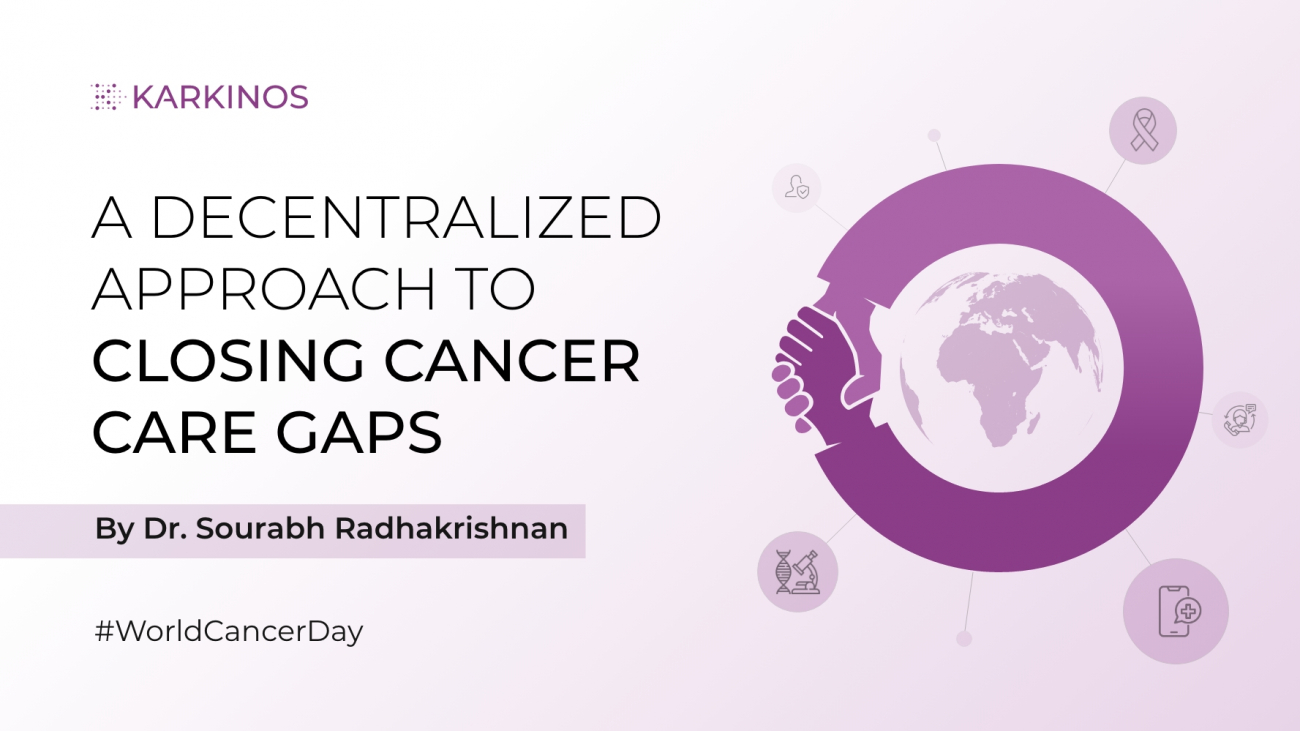Decentralized Cancer Care – A radical approach to close the gaps
By Dr. Sourabh Radhakrishnan, Senior Consultant and Director Medical Oncology and HSCT, Karkinos Healthcare Services
Breaking barriers, finding solutions and moving forward with a lot of positivity is what today’s cancer care requires. Worldwide, several challenges and disparities in cancer care are undoubtedly making the treatment complex, but there is also a significant awakening to the fact that meaningful solutions can be deduced to make the quality of life for a cancer patient much better. Advances in the studies of physiology, pathology, cancer biology, socio-economics, epidemiology, and immunology have all led to a better understanding of cancer as a disease and its effects on family and society.
This year, the fourth of February, being WORLD CANCER DAY, is set on the theme “Close the Care Gap”. The theme could not have been more relevant this year as the mutating COVID-19 virus has exposed several ambiguities, loopholes, and inequities in the healthcare delivery system, globally, that beg for solutions. It has exposed the problems of accessibility to basic healthcare and also highlighted the need for affordable healthcare. The pandemic has brought to fore all those lacunae and inequities in cancer care too that needed resolutions at a pace that would never have been perceived.
Exposing Challenges
We know that cancer is the second most important reason for death . There are many social factors and practices that can limit a person’s access to cancer care, more so in India. A myriad of obstacles that may include socio-economic status, racism, discrimination in sex, poverty, disparities in education, and family situations push a cancer patient out of treatment resulting in loss of life. In most instances, the sole breadwinner of the family succumbs to death caused by metastasized cancer, further pushing families into consequential poverty.
Such disparities affect every step of cancer care, i.e., from screening to treatment and the quality of life after cancer treatment. So, disparities in care can affect who develops, how it is developed and how one person dies from cancer. The issue of stigmas and taboos especially in cancers that affect women like breast and cervical cancers accentuate the complexities in delivering optimum cancer care. Most women are shy to present their problems to a physician and this is a major reason why most breast and cervical cancers that can be treated at Stage I advance to the untreatable Stage IV. It is further complicated by the woman foregoing her health crisis to deal with family commitments – mostly for financial and social reasons.
Misinformation about cancer is another hindrance in delivering care. Irrespective of educational qualification, it is widely believed that cancer means death or life sentence. There is no escape or recovery from it is what most people want to believe. Whereas, the fact is that not all cancers cause death. The outcome largely depends on the type, site and the stage at which it is presented to the physician to initiate the treatment.
Logistics for a cancer patient is another widespread problem. Majority of cancer patients live in areas where basic healthcare facilities are remarkably lacking in their vicinity. Located at remote locations, to get a screening or diagnosis involves the patient commuting to a hospital that costs money and time. Under poor socio-economic conditions, patients refrain from taking the travel that results in loss of potential treatment time. This poses a major challenge in delivering quality care.
Decentralizing care to bridge the gaps
Now, the problems and gaps in cancer care have been long identified. Every problem has a solution. So, there has to be solutions to all these problems in cancer care. “Decentralizing Cancer Care” is a viable option and is explored by both the developed and developing countries.
The Harvard T H Chan School of Public Health explains decentralization of health systems as a common pillar of health sector reform initiatives to improve efficiency and quality of services, as well as promoting accountability and local governance of the health system.
In order to provide the best possible care in the most affordable and efficient manner, the different stakeholders of the healthcare system have to work towards modernization of healthcare products and services, an effort fueled by the ubiquitous availability of technology. With the help of good human resources and also good telecommunications and digital technologies, the healthcare provider today has the opportunity to take healthcare outside the hospital settings into the home and community of the people.
The primary objective of Decentralizing Care is to take the healthcare products and services to the citizen’s/patient’s location closer to his/her home rather than practicing the inverse. Decentralization has the potential to address some of the greatest challenges in cancer care that can directly result in better outcomes for citizens and patients, while simultaneously reducing the financial burden.
Decentralized care can be achieved in three major ways, as below:
- By increasing outreach programs: the more the citizens are screened, the higher the probability of identifying cancers at an early stage. Increasing awareness among the public on the causes of cancers, early symptom indicators, education on personal care and hygiene have a significant impact on the outcome of treatment. Educating, screening for general health parameters, and diagnosis by trained health staff in population specific or risk-based areas based on demography play a radical role in identifying cancers that are common and those that can be managed or eliminated.
- Taking care closer to the patient’s home: This approach is largely adopted in recent years, as the healthcare providers have understood that this form of service addresses both accessibility and affordability issues for a citizen or a patient. The healthcare service provider also benefits from this model by saving stressed hospital resources.
In most cancer cases, the patient need not travel to the healthcare institution or large multi-specialty centers to avail treatment every time. It is only when a major surgery or complex protocols or therapies requiring an oncologist’s expertise is unavailable close by that the patient needs to travel and spend time at a specialty hospital. In other cases, most treatments and follow-ups can be resolved at an Out-Patient facility in a hospital around the patient’s locality. This will largely cut costs and save the patient’s time as well as money and make care accessible and affordable. Referral and partner hospitals in a distributed hospital network should help a patient get diagnosis or treatment based on the condition at the local hospital/clinic. It provides further scope to triage patients and improve treatment outcomes where both the treating physician and the patient stand to benefit.
- Capitalize on tech-savvy youth population: the ubiquitous availability of smartphones and the internet penetration together has caused information dissemination seamless. The tech-savvy and the millennial generation can be targeted to both raise awareness among the public as well as be self-aware of symptoms and causes of cancer. They could inspire or motivate the adults in their family to participate in screening programs conducted in their local hospitals. Also, the youngsters can be led by leaders or can be inspired by their teachers, role models or star icons to stay educated on good and clean habits and the potential harm caused by tobacco or other substances that can abuse their body.
Messaging platforms and social media sites serve a great way for mass dissemination of information on cancer programs in the locality as well as to highlight information based messages on preventing cancer.
Therefore, problems in cancer care are not permanently carved in a stone that cannot be blasted. The solutions are available, the application at the right time in the right direction is what matters. Keeping the patient in the center, distributing and tailoring cancer care with a focused approach can certainly ‘Close the Care Gap’.
On World Cancer Day, Karkinos Healthcare wants to emphasize that the company is committed to handling cancer as a disease more efficiently. An end-to-end platform has been designed to ensure that no patient is dropped out of the care pathway and the best of Quality of Care and Quality of Life is maintained for the patient throughout the journey of the treatment.
As the fundamental principle of Karkinos Healthcare is to offer democratized and distributed cancer care services in a participatory manner, the company has conceived a ‘hub-and-spoke and a further spoke model’. This model allows us to conduct frequent outreach programs, partner with existing healthcare providers, clinicians, diagnostic facilities, day care chemotherapy facilities, tertiary hospitals, and Apex centers, making decentralized care a reality. And while doing all these, we adhere and advocate the global vision of closing the care gap.

 About Dr. Sourabh Radhakrishnan
About Dr. Sourabh Radhakrishnan